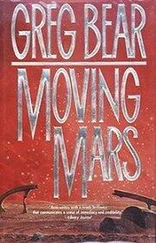In the meantime the story line concerning the narrator continues to develop in a gently descending line. The narrator ought to note that the narrow wooden stairs creak underfoot, while the door swings shut of its own accord behind his back. So this is the cellar. It’s spacious; high on the wall there is a vent, but it’s barred. In this place Feuchtmeier keeps a set of winter tires bought cheap in an end-of-season sale, and another set that he used last winter and is still perfectly good. He keeps old, worn-out, forgotten hockey skates here, and shiny, never-used diving equipment. Is Feuchtmeier a diver? He thought once about taking it up, that’s all. In the cellar Irene keeps an exercise machine — a stationary bicycle with gleaming speedometer. Once it occurred to her that it would be good to ride for fifteen minutes a day far away from the traffic. Protected by a plastic cover, her fur hangs on a coat rack; it was also bought cheap at an end-of-season sale and has never been worn. Feuchtmeier’s winter jackets are hanging there too, also in plastic covers, and his overcoat, turned inside out and showing its gray-striped lining. The same one that on another occasion would go missing at the airport, along with the opalescent marble that lives in the pocket. On the shelves lie tools: an electric drill, a circular saw, hammers, chisels, files, pliers. He had need of them long ago, when he was decorating a little room with wallpaper in tiny pink rabbits. Nearby is her sewing machine and a large wicker basket full of skeins of light blue wool, supplies that she may never use up, bearing in mind that the last time she drew from them was when she was knitting baby socks. The narrator’s gaze suddenly chances on a large mirror in a gilt frame that has been consigned to the cellar. It’s easy to guess that it was too showy for the Feuchtmeiers’ taste. It’s a little dusty, but all the same everything can be seen in it, the whole interior filled with abandoned emblems of out-of-date notions and unrealized possibilities. Can anything else be seen? Has the mirror reflected the material body of the narrator? Of course, this sort of question is simply waiting its turn; several others have already been given a wide berth. The male figure captured in the oval of the mirror as if in a trap moves hurriedly aside before further questions follow about age, eye color, clothing. The narrator is hurt. He had expected his privileges to be respected, and believed that everything concerning his private life would remain confidential. Whatever he says now will sound suspicious: Could he possibly have something to hide? And so he feels deceived, exposed to prying looks. Best of all he’d like to back out of the whole undertaking posthaste. He doesn’t think much of it anyway; he allows himself to be critical of its conventionality, and its artificial character irritates him. He could break free of it very easily if he were to leave this house. At a smart pace, without looking back, across the terrace even. There he might bump into Feuchtmeier, who has just caught the lighter in midair after Irene has tossed it to him. What would come of such an encounter? The smashing of the three-sided frame on which the story is pinned would cut it short. There’d be nothing more to tell. Somewhere in the neighborhood there ought to be a stop of the suburban rail line running directly to a large central station where in each corner of the main hall there stand trash cans full of half-eaten rolls and paper cups containing the remains of coffee. Amid the snarling automobiles, clanging trams and crowds hurrying along the streets it would be possible at once to start a new life as a hobo, and in this simple way hop over into a different story and live or die in it with no responsibilities. But also without privileges — as any old character. For a moment he is even sure that this is what he wants and that the one who appointed him will agree willingly to release him from all obligations. Except that the door has slammed shut and the narrator is no longer able to get out. Now he regrets his haste; he regrets the fact that he turned out to lack the perseverance to sit down on the stairs three floors above and remain there till he achieved his end and the elevator and its shaft returned to their place, even if he had to wait forever. On the floor above, the tower of cans tumbles down once again, but here the noise is muffled and hollow, like the distant echo of a storm. And in this way the narrator is detained in a dead zone of the story, amid dust-covered accessories.
In the silence that falls at this moment, there might for example ring out a short wave of simplehearted, premature applause. But it would die down at once embarrassedly, as sometimes happens during a concert when the musicians fall still for a moment to gather strength before the next movement. The piece being played by the orchestra will not come to an end until, with implacable consistency, there sound within it all the events that can possibly be contained by the form imposed upon it, no one knows by whom. And so it is not hard to comprehend why the subjects must continue to be developed, though if the question were asked differently — what are they developing for, to what end, what circumstances other than the fee paid to the musicians call into being the movement of the bows, and what patent thing necessitates the vibration of moist air in the brass loops of the trumpets — no answer could be found. It might equally well be asked why ships ply the ocean waves, why the circus audience holds its breath or bursts out laughing, why and for what is the sickly sweetness of chocolate, the banal literalness of pineapple slices in syrup, and the coarse smell of carbonated drinks. It could also be asked why Feuchtmeier lives and why Irene lives — after all, they’re unable to be happy, though they need considerable amounts of water, electricity, and gasoline to satisfy all their wishes, and considerable amounts of coffee with cream, light cigarettes, and red wine. And it isn’t even possible to stop at such questions. It must be asked further: Why does the acrobat Mozhe or Mozhet live, recklessly balancing on the tightrope, or his partner Touseulement, who every evening throws herself into the void without hesitation as if life held no value in her calculations, though she assigns no little importance to the durability of the fillings her dentist gives her. It should be asked why the retired university professor clings to life when he is tormented by rheumatism and has one foot in the grave; or the hobo with the earring, used to going without dinner, without a roof over his head, without a bank account. Or others — let’s say it straight out — everyone, including the passers-by hurrying along. And so questions should be asked, and asked over and over. The characters fear these questions like death itself; they tremble before them, holding on if only to the handle of a china teacup, since it’s easy to foresee that things are unlikely to end with questions alone.
THOUGH IT WILL NOT BE A SIMPLE TASK, let us try to imagine the continuation of this tale — for the moment, let’s say, only the next paragraph, which begins with the buzzing of a fly. The buzzing ought scarcely to be audible at first; then it grows louder and louder. Only recently released from the trap that the Feuchtmeiers’ hallway proved to be for it, the fly finds its way to the ceiling of their cellar and taps in vain against the firmly closed vent. Yet even if it breaks out finally into open space, it will not find freedom there, but merely another prison. And so there, too, it will agitate its wings without respite until it enters some open window. The succession of places from which there is no way out, to which open spaces also belong, is brimming with a combination of regret and desire. The world, obviously, does not end with the Feuchtmeier’s cellar; beneath it there extend further floors. And if the narrator claims that he is stuck in the cellar, he is not entirely wrong, though in essence it is not there that he is stuck, but in something significantly larger that is also firmly and hopelessly enclosed. But even if he has been imprisoned in a dead zone of the story, it is only partially. For his being is given continuity by the volatile essence of longing, and not by the sluggish weight of a body that could equally well belong to someone else and be located somewhere else. The level of this essence is evened out in the long series of rooms like an arrangement of linked containers. Whereas if there should be a lack of connections, it must quite simply penetrate through the walls or ceilings. It’s already drifting in places where the narrator has yet to set foot. And in this way the words ‘already’ and ‘yet’ which have no obligation to reckon with anything at all, thus demonstrate their absolute superiority over the substance of concrete and summon accomplished facts into being. And the narrator, who controls virtually nothing here, ought only to note that somewhere beneath the turf of the garden, below the layers of earth in which worms and moles dig their tunnels, lie the platforms of a local rail station. Livid graffiti appear there. Painted on dirty plaster, the initials of last names compete for one’s attention: an elaborate S, which a spray paint wielding Schmidt unknown to the narrator has left stealthily on the wall, and an extravagant B put up by some Braun. They may have been the ones who tried out a new can of paint by adding a blotchy commentary to a film poster pasted up on the platform. In it the narrator recognizes the man’s black sweater and the bright highlights in the woman’s red hair. The film couple, John Maybe and Yvonne Touseulement, is kissing on a steeply sloping roof, beneath a firmament that has come slightly unstuck from its base.
Читать дальше












